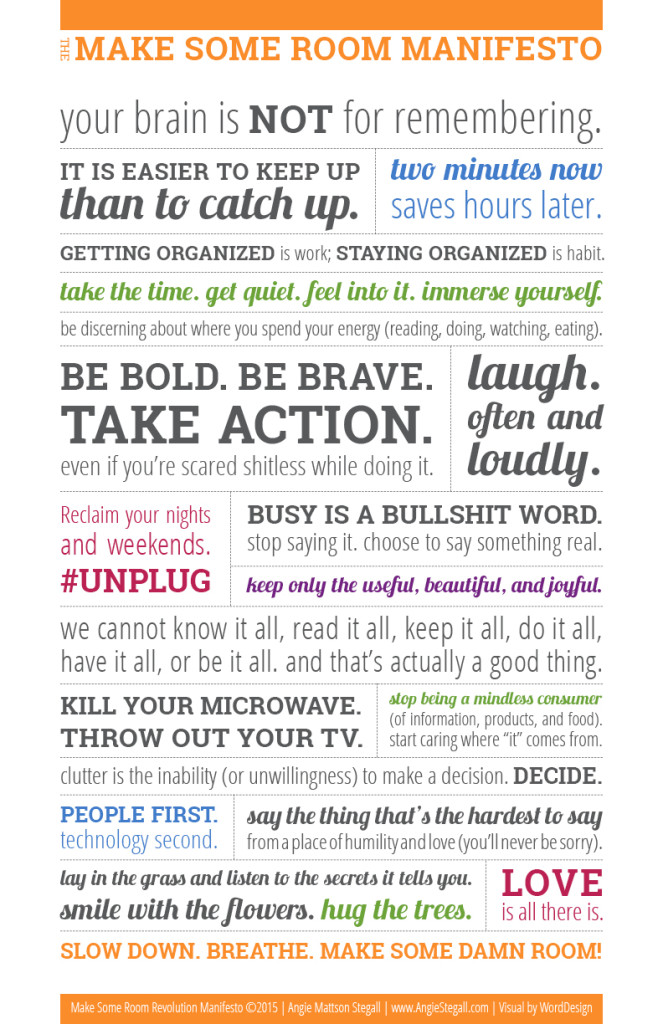Reclaim your nights and weekends. #UNPLUG
 After our Grand Canyon trip, Nelson and I returned home to a mountain of mail. Lots of junk, too many credit card offers (feh!), and a bill or three.
After our Grand Canyon trip, Nelson and I returned home to a mountain of mail. Lots of junk, too many credit card offers (feh!), and a bill or three.
My favorite part of the mail is receiving magazines. I don’t subscribe to many, but I love the ones I get. Inc. Magazine, Mother Earth News, Fast Company, and Our State (a North Carolina magazine).
On this day, upon returning from such a life-changing adventure, it was the feature story on the cover of Fast Company that grabbed my attention:
#UNPLUG: My life was crazy. So I disconnected for 25 days. You should too.
Egads! I sat with the glorious truth of having just disconnected for 16 days during our trip. No smartphone, no email, no internet service of ANY kind. No plumbing or electricity (I’ll spare you the details on the plumbing). If I needed a light, I either used my headlamp or the moonlight (which was full towards the end of our trip).
Flipping to the article, I read that the interviewee was a guy who was very involved in EVERY social media outlet possible. His online presence was HUGE.
You, gentle reader, may not be quite so connected. It doesn’t mean, however, that you don’t relate to his reasons for wanting to unplug:
- His life was crazy busy – 24/7 crazy busy.
- He was fully connected to everything and everybody, especially through social media.
- He wanted to be free of obligations, most of which asserted themselves in some way in digital fashion.
- He needed a mental break.
- He wondered if how things would continue without his involvement.
Can you relate, even a little bit?
Beyond the Canyon
If you think about it, many (most?) of the requests for your time, your money, and your energy come to you digitally or electronically (email, text, phone, social media).
Suffice it to say, it’s stressing you out (I say this as a statement of fact for many of us). It’s distracting you. And it also may be leading you to suffer, consciously or unconsciously, from FOMO (Fear of Missing Out).
I know you are checking email in the middle of meetings or the middle of the night or as your employees (or spouses, partners, or children) are trying to talk to you. You’re listening to voicemails or reading texts while you’re driving (or at best while stopped at red lights). Your phone comes out in the middle of dinner with your family. And sadly, instead of reaching for the person sleeping beside you, you reach for your personal devices (tablet, laptop, smartphone) as soon as your eyes pop open in the morning, right?
You fear missing out on:
- The next big deal
- The next big potential client
- The newest news
- Details from the Really Angry Client (we have to be responsive, don’t we?)
- Being “in the know”
- An “inside scoop” or office gossip
- A promotion or the next great offer
- What your own brain might come up with
- What your inner voice might want to share with you
Those last two might actually be more avoidance than fear of missing out, but you get the picture.
Let’s talk about a digital detox (also known by the hastag #UNPLUG).
The saturation of digital connectedness in our lives is epidemic. And I assert it’s unhealthy if we just “let it happen,” like waves of information lapping over heads, threatening with each new surge to drown us.
The good news is there are ways to regain control and reclaim your sanity. As the Dog Whisperer, Cesar Milan, would say, “We must embrace rules, boundaries, and limitations.” It’s the only way to beat back the crazy.
Truth is, though, we’ve forgotten how to unplug. Check out. Be still. Do nothing. I believe we’ve even forgotten what it means to unplug.
And frankly, the stress of this is making us sick and miserable. And for some, it’s killing us.
#UNPLUG
Part of my mission in life is to encourage EVERYONE to unplug, check out, be still, and do nothing, even if for just a few minutes each day.
I know, I know, unplugging sounds scary – after all, the reality is you suffer from a “Fear of Missing Out” (FOMO).
Your devices are designed to grab your attention. Did you know you get a hit of dopamine from each buzz, beep, ding, ring, and vibration? And the dopamine reward has deepened your habit and created a reward cycle in your brain that IS an addiction. When you hear/feel your device, someone else’s, OR just imagine you do (called Phantom Vibration Syndrome), we still get that hit of dopamine. Conversely, all that buzzing, beeping, dinging, and ringing causes a rise in cortisol (the “fight or flight” hormone). Too much cortisol, though, makes your adrenal glands wear out quickly. With all the up and down of your hormones, over time, your health truly begins to suffer.
Additionally, you might begin to notice you feel “naked” without your device, vulnerable to the “big, bad world.” And as a status symbol, your device might become part of your identity (like an extra appendage or a crutch) – something you unconsciously use to avoid downtime or conversation, or to bond with others (“Look, I have the newest, latest, greatest, coolest iPhone”).
And the issue isn’t going away.
In fact, our screens and devices are becoming more pervasive every single year.
Here are a few facts to get your attention:
- On average, Americans stare at some type of computer screen for eight hours a day (more time than we spend on any other activity including sleeping).
- Teens fit some seven hours of screen time into the average school day; 11, if you count time spent multi-tasking on several devices.
- When President Obama ran for office in 2008, the iPhone had just been introduced.
- Smart phones outnumber regular ones and more than a third of users check their smartphones before they even get out of bed.
- The average person, regardless of age, sends or receives about 400 text messages a month—four times the 2007 number.
- The average teen processes an astounding 3,700 texts a month, double the 2007 figure.
- More than two thirds of normal, everyday people report feeling their phones vibrate when, in fact, nothing is happening with their phone (researchers call it “phantom-vibration syndrome”).
Peter Whybrow, the director of the Semel Institute for Neuroscience and Human Behavior at UCLA, argues, “the computer is like electronic cocaine,” fueling cycles of hyper manic behavior followed by periods of depression.
Altogether the digital shifts of the last five years call to mind a horse that has sprinted out from underneath its rider, dragging the person who once held the reins. No one is arguing for some kind of Amish future. But the research is now making it clear that the Internet is not ‘just’ another delivery system. It is creating a whole new mental environment, a digital state of nature where the human mind becomes a spinning instrument panel, and few people will survive unscathed.”
So, what’s the solution?
I’m so glad you asked…
Rules, Boundaries, Limitations
According to Wikipedia, “personal boundaries are guidelines, rules or limits that a person creates to identify for themselves what are reasonable, safe and permissible ways for other people to behave around him or her and how they will respond when someone steps outside those limits. They are built out of a mix of beliefs, opinions, attitudes, past experiences and social learning. Personal boundaries operate in two directions, affecting both the incoming and outgoing interactions between people.”
Down deep in the Canyon, we couldn’t have plugged in even if we wanted to. It was a gift that the only electronic device we had was a satellite phone for emergencies.
Push vs. Pull
Your devices are designed to default to a “PUSH” functionality. This means they automatically want to push information, sounds, alerts, badges, and notifications at you.
My advice to save your sanity? Turn them OFF. #UNPLUG
Turn off the bings, dings, buzzes, vibrations, and visual alerts. This way, you make the choice to engage thoughtfully with the devices instead of those devices interrupting you continuously with their artificial urgency and neediness.
Don’t just think about your phone. Think about all your devices:
- Smartphone
- Tablet
- Laptop
- Desktop
- Televisions (watch out – they are becoming smarter!)
Get into a routine of checking them just a few times a day, for as little time as possible. Pull information towards you when you need it, rather than being overwhelmed by it being pushed at you all the time.
Driving the point home further, down in that deep canyon, there was no way to be bothered by the dings, bings, beeps, buzzes, or alerts.
Think about your routines
Do not be complacent. Do not use these devices unconsciously. Choose, decide, and set some rules, boundaries, and limitations for evenings, weekends, and group events.
This puts YOU back in control.
Ways to make some room
 Here are some suggestions that have helped me:
Here are some suggestions that have helped me:
- When I am with someone, I keep my phone in my purse. I put the ringer on silence. If I am expecting a call, I will alert the person I’m with that if the phone rings, I will only take that one call.
- During a meal with others, I focus on the people and leave my phone in my purse. I prefer to enjoy their company and the conversation.
- At night, I have my phone scheduled to “sleep” between the hours of 10 pm and 7 am. I won’t get any alerts or notifications (though I’ve turned most of those off anyway). The random client that might try to call or text after 10 pm, my phone won’t interrupt my evening or my sleep.
- During vacation, limiting “screen time” can be a healthy way to “unplug.” My husband and I post photos to our Facebook group (YukonandBean) but otherwise limit our time checking Facebook or email.
- Stretch goal: turn off devices on the weekends!
Make it your mission in life to #UNPLUG with some regularity. Turn it into a habit and see how your life and your relationships improve because of it.
Have you missed any chapters
- Introduction
- Chapter One
- Chapter Two
- Chapter Three
- Chapter Four
- Chapter Five
- Chapter Six
- Chapter Seven
- Chapter Eight
Also, stay tuned for the final in the series (but NOT the end of the book) Chapter Ten (#Busy is a bullshit word – stop saying it. Choose to say something real instead.) next week!
 [All content and photos are (c) 2016 Angela Mattson Stegall and Nelson Stegall for the book, Make Some Room: Powerful Life Lessons Inspired by an Epic 16-day Colorado River Rafting Trip Through Grand Canyon.The book will be available mid-June through Amazon.com in paperback and Kindle formats.]
[All content and photos are (c) 2016 Angela Mattson Stegall and Nelson Stegall for the book, Make Some Room: Powerful Life Lessons Inspired by an Epic 16-day Colorado River Rafting Trip Through Grand Canyon.The book will be available mid-June through Amazon.com in paperback and Kindle formats.]
